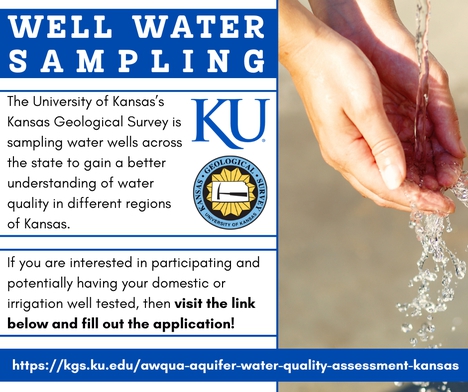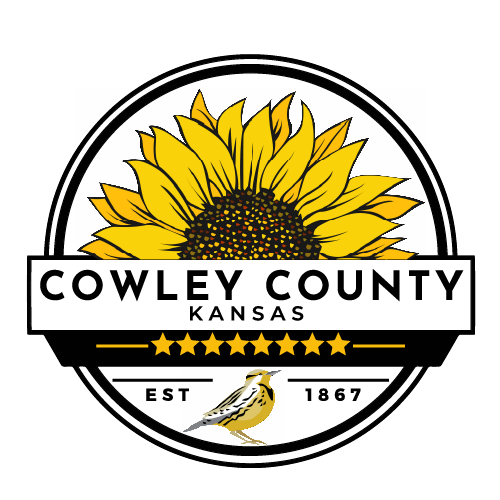Environmental Protection Program & Septic Inspections
KU Kansas Geological Survey Well Water Sampling
The University of Kansas’s Kansas Geological Survey is sampling water wells across the state to gain a better understanding of water quality in different regions of Kansas.

What is the Local Environmental Protection Program (LEPP)?
 The Health Department’s LEPP works to protect and preserve the health of the environment in order to safeguard the health and safety of the entire community.
The Health Department’s LEPP works to protect and preserve the health of the environment in order to safeguard the health and safety of the entire community.
WHAT DOES THE LEPP DO?
The LEPP accomplishes its goal of protecting community health by providing vital services including:
- Wastewater system inspection
- Well water screening
- Real estate transfers
- Environmental lead assessment
- Pollution prevention
- Floodplain analysis
- Building permits
- Addressing environmental concerns
- Nuisance abatement
These services are all key parts of preserving the health of the community. Check the next section to learn more about these services and how to apply.
Click the button below to access the Cowley County Sanitary Code.
Services
The services detailed below constitute the Health Department’s efforts to protect community health by protecting the precious water resources of the county. All forms, applications, and requests should be filled out electronically, printed & signed (if applicable), and emailed to septicinspections@cowleycountyks.gov
PRIVATE WASTEWATER SYSTEMS  Many in rural communities rely on private wastewater systems and the Health Department plays a key role in the regulation of these systems. The Health Department provides guidance in the construction of wastewater systems through inspection and the issuance of permits. Click the buttons below to learn more.
Many in rural communities rely on private wastewater systems and the Health Department plays a key role in the regulation of these systems. The Health Department provides guidance in the construction of wastewater systems through inspection and the issuance of permits. Click the buttons below to learn more.
PRIVATE WELL WATER SCREENING
Private wells provide drinking water for many households in rural communities, and maintenance of these water resources is foundational to preserving health. The Health Department provides screenings for private wells that test for pH levels, the amount of Total Dissolved Solids, nitrate levels, and the presence of coliform bacteria.
Coliform Bacteria
Coliform bacteria are commonly found in fecal matter, and some can cause severe illness, such as E. Coli. If the presence of coliform bacteria is detected in drinking water, it is NOT safe for consumption.
The presence of these bacteria in well water could indicate contamination from a septic tank or animal waste.
Nitrate
Agricultural runoff can result in elevated levels of nitrate in groundwater leading to the contamination of well water. When consumed, high levels of nitrate can have negative effects on human health.
Nitrate levels above 10 parts per million (ppm) are considered NOT safe for consumption. If a nitrate test shows levels higher than 10 ppm, you should find a safe alternative drinking water supply. However, it should be known that nitrate is only a concern for ingestion (eating and drinking), and it is not absorbed through the skin.
Click the following link for more information: Nitrate in Drinking Water FAQ
Click the button below to access the Well Water Testing form.
FLOODPLAIN DEVELOPMENT
The LEPP also engages with guidance for development within floodplain areas. Click the button below to access the application for floodplain development.
NUISANCE ABATEMENT
Another service offered is through the abatement of nuisances. Click the button below to access the Nuisance Complaint form.
SANITARY SERVICE APPLICATION Septic trucks require permits to transport sewage within Cowley County, and a copy of the permit must be kept on the vehicle. If you are interested in applying for a Sanitary Service permit or need to renew, click the button below to access the Sanitary Service Application.
Septic trucks require permits to transport sewage within Cowley County, and a copy of the permit must be kept on the vehicle. If you are interested in applying for a Sanitary Service permit or need to renew, click the button below to access the Sanitary Service Application.
Information & Resources
Wastewater Systems
Private wastewater systems provide water treatment for households not served by a public sewer system. The design & size of these systems can vary widely due to multiple factors including household size, soil type, site slope, lot size, proximity to sensitive water bodies, weather conditions, or local regulations.
Click here to learn more about the various types of septic systems.
Maintenance
Maintenance of these systems is of the utmost importance, as a poorly maintained wastewater system can pose a severe threat to the health of the community and the local environment. It is the responsibility of the wastewater system operator to keep it maintained and functional.
Click here for K-State Research & Extension's guide to septic tank maintenance
Click here to learn more about proper wastewater system maintenance.
Wastewater Lagoons
Wastewater lagoons are another option for private wastewater treatment. These systems are among the least expensive and may be the best option depending on the soil type and space available.
For specifics on the installation, construction, use, and maintenance of a wastewater lagoon in Cowley County, use the link below
For general guidelines, click the button below.
Visit the links below for additional information:
Wastewater Lagoon Construction
Wastewater Lagoon Maintenance
Private Water Wells
Many households in rural communities also depend on private wells for drinking water. The presence of coliform bacteria, chemicals, or other particulates can result in devastating effects on human health. Regular maintenance can protect household health and ensure that these problems do not arise. Visit the links below to learn more:
Water Well Maintenance
Private Water Well Guidance
Water Well Treatment
Emergency Well Chlorination
Waterborne Illness
Diseases spread through ingestion or exposure to contaminated water are known as waterborne illnesses; some examples include cholera, E. Coli, and dysentery. The LEPP works to prevent waterborne illness by protecting the water resources of Cowley County via the services offered above. Visit the links below to learn more about waterborne illness:
Waterborne Illness Information
Waterborne Illness Prevention
Flooding
Floods are the most common natural disaster and can occur anywhere where water is present. Besides the devastating damage that floods can cause to life & property, they can also pose a threat to human health through contamination of water sources and the spread of tainted water. The rivers, streams, & creeks that flow through Cowley County all carry the potential to flood and cause harm to surrounding areas. Visit the links below to learn more about preparing for and responding to floods:
Flood Safety
Floodwater Safety
Floodwater Cleanup
Public System Drinking Water Information
The state of Kansas provides information about the safety of drinking water provided by public drinking water utilities in the state on a county-by-county basis. Visit the link below for more information. For any questions, contact the Health Department for assistance.
Drinking Water System Information












